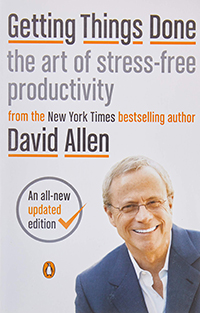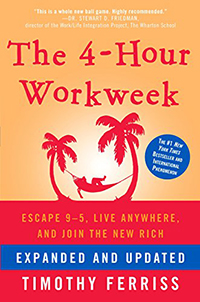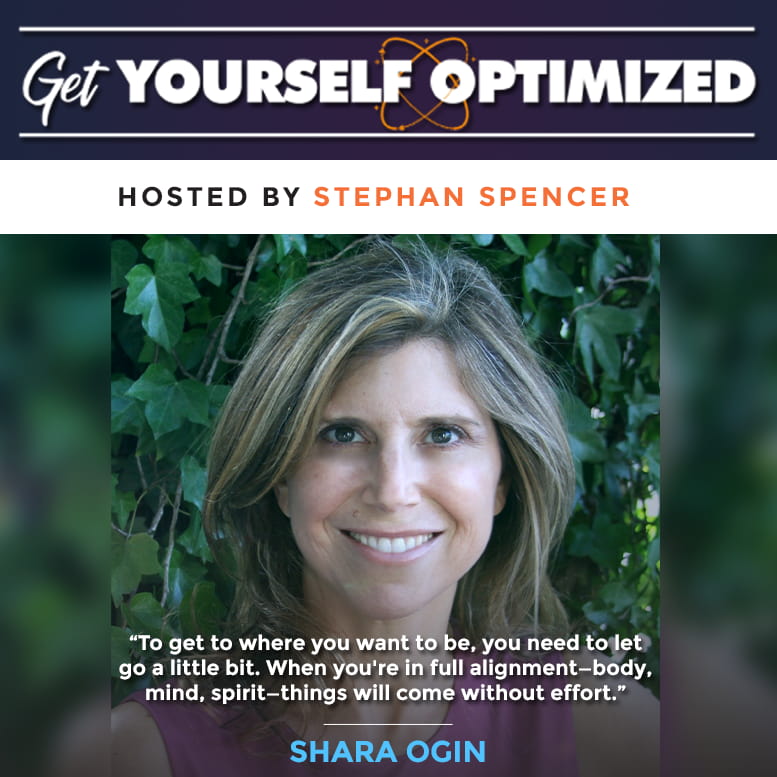
So David, thank you very much for being with me today.
My pleasure, Stephan.
So, I thought we could get off the ground here just by getting an explanation from you of what is your concept of “time management.”
Well, you can’t manage time, you actually only manage what you do during the time. So the management issue is not so much about time, it’s more about how you manage your focus, how you manage your actions and your activities in terms of what you do. That’s one of the problems, Stephan, with that whole field of time management as they mislabeled the problem, and as they mislabeled the problem of time, everybody thinks the calendar is going to be your solution, but it isn’t.
So what is the solution, then?
Well, since you have to manage your actions, you have to make sure that you’re taking the right actions. In order to make sure that you’re taking the right actions, there are two very critical things you need to get clear about, and that is what does “done” mean, what you are committed to accomplishing and finishing, so the sort of outcome thinking as half of the equation. In other words, to get things done, you need to know what “done” means which is not always that self-evident.
The other half of the equation is you need to know what “doing” looks like and what actions that you need to take from this. This issue about launching a new campaign is the next step at a computer? Is that at my boss? Is that at the hardware store? Where is it? What is it I need to do? So I can’t manage the action unless I know what the action is. So those are two critical things to do, as simple as that sounds, as you probably know, those are not self-evident events, and you have to train yourself to do that kind of thinking on the phone.
Yes, I do know all about that. So what are the biggest time stealers for most folks?
You can’t manage time, you actually only manage what you do during the time.
Well, again, it’s not that time issue, so a time stealer, I think I know what you mean, it’s like, what is it that distracts people from doing what they think they ought to be doing? That could be as varied as there are people, they are the traditional stuff called “Look, let me skip to the bottom line.” What you’ll tend to avoid doing is probably the most important thing you need to do because it’ll probably be the most daunting and the most potentially successful thing you could be doing, and that’s usually out of people’s comfort zone. So it’s a fairly normal–I don’t know if it’s natural–but it’s really a normal response for people to be just procrastinating about things that are fairly significant to them.
People allow themselves to get distracted; I think, ultimately, probably the biggest thing that gets in the way of people doing what they ought to be doing at any point in time is a distraction. People allow those distractions for a lot of different reasons, but “distracting” means, “Wait a minute, I’m off purpose, I’m off course, I’m off what I should be doing.” A lot of what I’ve uncovered is what is it that creates those distractions and how do you minimize them. So one of the biggest distractions people have is that they haven’t managed their own commitment, so they’re sitting there and thinking about trying the thing about one thing and 6,000 other things, and those little harpies are picking away at their brain that’s probably.

When you’re not really clear about what you should be doing, you’ll get sucked into whatever is the latest and wildest or the easiest thing to do or the most habitual thing that you’ll need to do, so all those factors. It’s a big long answer to your question, but all of those factors I think can ping on all of us all the time.
Would you say that procrastination or getting distracted by other less important things is the biggest barrier to self-actualization?
Well, self-actualization, I guess one of the biggest barriers is ourselves. Self-actualization–look, there are some parts of you that want to show up and express yourself and expand yourself, maybe in ways that you haven’t yet. In other words, there’s more of you to show up here than it’s here yet, and whatever is keeping you from doing that–and for the most part, it’s usually a self-esteem issue, it’s your own image of yourself that needs to keep moving forward and keep upgrading itself, and that’s a challenge we all have. I don’t know that I would get that specific about “Look, if you’ll allow yourself to be distracted, it’s usually because there’s some part of you that haven’t fully identified, in some positive, successful way, with where you’re going that would cause you to have the focus you need.”
In other words, let me give you a simple example, distraction is not an issue of suddenly the sirens going off and the smoke pouring out, and you can see all the heat in terms of the fire alarm. You’ll probably not going to let yourself procrastinate about that because you’re very clear on the outcome called “live.” Suddenly your life comes just gets all together, you’re not distracted at all, and you get you moving to high performance. Most people move actually into high performance in a crisis because that creates the kind of focus that creates high performance. The problem is, when your focus is created by a crisis, then the frontal lobe shuts down essentially, the frontal cortex, which is your intuitive intelligence. So you get very clever and very stupid in a crisis. Also, you pump adrenalin into your body from what you–physiologically, you’ll crash. So crisis-created high performance and focus, yes, they will create kind of a high-performance behavior, but it won’t be very sustainable, and it won’t be the elegance of the high performance. What if I could move into that kind of focus and lack of distraction without a crisis forcing me to do it? Now, that’s the real elegance.
Yes, so a lot of people claim that they really need a crisis in order to get that focus and get into that high performance, but of course, that just really damages your body long term because of all the stress and adrenalin.
It could, I think there are times, and probably since I’m probably talking to a lot of people right now in the marketing world and advertising and PR world, which probably needs a little bit more right brain in this population than maybe a lot of the other business populations that I would talk to. Given that, there’s probably a really good chance that deadline-driven creativity is well known.
Deadline works because it forces you to make decisions.
Now, that’s not necessarily a bad thing. The reason that the deadline actually can work very well for you is what it forces you to do is make decisions. So it’s not so much that if you got the deadline, you know you’re going to finally have to decide, “OK, look, that’s the piece of art. No, that’s the copy, that just going to have to go.” As opposed to, “Oh, gosh, this is going to be perfect.” You could just imagine if you had to turn in something early, think how good it would have to be. But if you’d wait till the deadline, you can always pretend like it could have been better if I’d had more time, but finally, I just had to make a decision. So there are a lot of reasons why deadline-driven may actually–it’s not necessarily a bad thing, it just all it does is it speeds up and makes you a little proactive about decision making.
Right.
Because I do the same thing. Come on, I’ve found that packing–I’d like to make sure I have the right clothes, especially in the spring or fall if you’re going to a city where it could be extremely cold or extremely warm or wet or dry, you have all those options. Now, I could spend four days agonizing over all the stuff I should take in a suitcase. So I always wait till the last 30 minutes before I need to walk up the door to pack because that just forces me to make those decisions. So that’s not a bad thing, I just come to accept that and have fun with it, and that’s the way I play it. So it’s not necessarily, I think, a bad thing that we use deadlines to some degree to our benefit.
But it can create stress, though, so how do you manage that stress? What are your favorite de-stressors to help manage that?
Well, I think stress only comes from the fact that you think you should be doing something, then you’re not. So that’s negative stress anyway, I think positive stress is actually a good thing. It’s sort of the stretch goal “Wow, let me see how much faster I can run” or “Let me see how many more ideas I can generate in five minutes.” So I think that kind of stress that you put yourself into a challenging kind of situation is actually a very good thing. If we didn’t have any stress, we’d never grow, and you’d probably test your mettle, and you’d probably come up with a lot of creative stuff that people come up with by being somewhat on that edge.
But I think what you’re saying is, if you find yourself sitting there stressing, and it’s not producing anything of value other than toxicity in your body, then probably a good idea would be to shift gears. Probably the way you see things, or from where you’re seeing them, is not the right altitude or attitude, it’s a good idea to get up and walk around. Change your focus. And there are lots of good ways to do that – go for a run, go for a walk, just get up and walk around, stand up, sit down, do something different than what you’re doing. Physical movement will sometimes shift your gears as well. Those are just some of the more… dealing with the symptoms and dealing with the physiology. I use those all the time. You’re never going to get rid of stress here, I mean, gee, if there’s a loud noise out there, just sound is a stressor on the body. We live in a world that’s got all kinds of inputs for us, so we oftentimes are just having to shake that off in other kinds of ways.
Pay attention to what has your attention.
I think the topic you’re dealing with here when we talk about personal productivity, time management, procrastination, etc. Those suppressors you actually can address, but those are not necessarily instant sorts of things. Well, they are in the way. One of the things you can ask yourself is what is the thing that is most bothering me right now, and how could I resolve that quickly? That takes some guts to step up to the plate and look at what those things are. The old salt theorem, the way out is through, has a lot of good advice for us there. One of the things I’m teaching these days, and one of my favorite circuit concepts now, is that paying attention to what has your attention is a very valuable thing to do.
So if you’re in a stress modality, the really good idea is to ask yourself if you’re willing to be honest with yourself and say what right now, if it were handled, resolved, finished, clarified, or whatever, would take the biggest pressure off of me? Sometimes just having a conversation with your boss, or maybe going and finding out what somebody really does think about you, as opposed to fretting about it, or finding out if you could renegotiate with the powers that be this thing that looks like it’s going to be late. All those common-sense things are often what are creating the stress. It’s not a bad idea to be somewhat self-aware in terms of what’s the source of it.
So for somebody who is implementing your methodology of GTD, or Getting Things Done, there’s quite a transformation for those who actually adopt GTD and stick with it and really do apply it in their lives. What’s the typical before and after in terms of what somebody’s going to look like before and after they adopt GTD?
Well, you know, it’s funny. From the outside looking in, it may not look that different. Even somebody’s office may not look that different. The difference would be, here’s one of the subtleties of it, you might look at somebody, and they’ve got a sports bag lying around their office, and they have reports piled up on one corner of their desk, and they have a folder of a big project right in front of them, and they have six more project folders on the side. So before and after doesn’t mean that they have a messy desk, and now they’re going to have a totally clean desk. Although that may happen. Before and after means before you’re sitting there, and there are a lot of decisions not made about all that stuff lying around you. The sports bag actually represents “Oh, gee, there’s somebody who invited me to a tennis game, but I haven’t gotten back to them yet. I haven’t decided what to do about that. And oh yeah, I need to re-up my membership”. In other words, they’ve embedded all sorts of decisions and things inside of all those. That’s the before, and people just sort of live in that gnawing sense of anxiety. So they’re not all that aware that they’re stressed out.
Afterward, they may be sitting in an office that sits very similar to that, but guess what. They’re sitting there going da-da-da-da-da, I wonder where I should focus next. What they’ve done is they’ve taken all those things that were impending on their psyche, made the appropriate decisions about it, parked the results of that thinking in some appropriate place, and now they’re actually sitting there with much less stress, much more efficient because they’re not re-thinking things back and forth. They’re leaving work half an hour sooner. They’re plowing through their emails 40% of the time that it used to take them to do that. And they’re ready for a surprise. They’re sitting there and say, suddenly get interrupted, that’s OK. I now know where to park that and how to engage with it. So it’s a little subtle. It may not be all of a sudden you see a person totally scatterbrained and out of control, and suddenly you see somebody kind of anal and totally clean. It’s not like that at all.
Would you say somebody who’s in a state of adopting GTD is more adept at being able to say no?
Yes. Very simply. Mainly because if you don’t know what you’re not doing, it’s hard to feel comfortable about what you’re not doing. If you really haven’t managed the total inventory of all the commitments, you kind of almost, out of your integrity, have to take on any commitment anybody of authority asks you to do, simply because you don’t know how much you’ve got, and maybe you could do it, and oh damn. As opposed to here’s the 65 projects I have. You’ve been staring at them and reviewing them on a constant basis, with all the attendant actions. It’s going to be a little easier for you to say excuse me, wait a minute.
I’m going to have to either say can we renegotiate this thing, or if I do that one, these others are going to have to drop off. Those are not easy conversations to have, but they’re almost impossible to have if you haven’t got an idea of what your inventory is. But getting really clear about what you’re not doing, meaning clarifying what are all your commitments at all these levels you’ve got them, being able to see those and review them and be objective about those in some consistent basis just matures up your ability to make those hard decisions in the triage, and just say whoops, sorry, I just don’t have the bandwidth to commit to that.
So somebody who’s really got a good inventory of what’s on their plate and what needs to be done and when, they’ve constantly been checking this over, and part of the process of being able to be up to date with what your commitments are is a weekly review. You’ve stated before that this weekly review is an extremely important component of GTD. Can you explain the significance of the weekly review?
Your calendar review is certainly as important tactically as a weekly review.
Sure. Actually, you need to review a lot of things at a lot of different levels. Your calendar review is certainly as important tactically as a weekly review. You finish getting off this interview with me, Stephan, what are you going to do next today? If some part of you hasn’t looked at your calendar and your other commitments down at that mundane and tactical level, you’re going to be stressed out.
The next level up from that in terms of the horizons of your stuff would be the kind of things that you probably ought to be looking at, not necessarily every hour or even every day, but at least once a week. That’s the level we identify as projects. We have a very broad definition – meaning anything you want to finish that’s going to take more than one step to get there but you can probably finish within the next few weeks or months would be a project. Given that definition, which includes things like researching cell phone services, hiring an assistant, restructuring my department, launching a new campaign, get a dog… if you include all of those, most people have between 30-100. That review of those 45 or 72 things like that on some consistent basis… you’re not going to have the time or the bandwidth when you’re going through the day-to-day, crank it out, to be backing off and looking at that inventory as a whole group of things.
So that once-a-week look that’s driven by a review of all those things we called projects, and bringing up the rear guard, and identifying the new projects that have shown up… anyone listening to this podcast right now, I guarantee you right now in the last three to four days, there have probably been at least two or three things that have shown up that now represent problems or situations or issues or circumstances that you’ve got some level of a commitment to finish something about that, but you haven’t yet had time to sit down and clearly identify what it is you’re committed to finish as a project, and what the action steps are on it. The question is, when are you going to do that? Because I don’t have time to make those decisions either when the world is coming at me so fast and furious. But if I let that go too long boy, that backlog will mount up psychologically on me, and very quickly, and just start to numb me out. So that’s why I discovered once a week, you better sit down and hold the world back and bring up the rear guard.
Once a week, you better sit down and hold the world back, and bring up the rear guard. Click To TweetIdentify the new projects that have occurred, mark off the old ones that have finished, catch up with all the ones that are still pending in terms of what’s next on them, and get real current and complete about that stuff. That seems to be the most – the reason we stress it so much is because it seems to be the most lacking.
There are people out there, the vision mode, are maybe doing — yeah, their brain is in the blue sky, and they are doing all kinds of vision and purpose and mission and brainstorming and all that. And they got a phone list of people to call this afternoon, but they are not doing much in between. And it is that in-between sort of operational review that seems to be the most lacking and also has the greatest potential, I think to relieve the most stress if that is done appropriately.
So, why is it that the weekly review, which is extremely important, why is the area that GTD practitioners fall off the wagon the most, and how did they turn that weekly review into a habit that really sticks?
You know, I don’t know Stephan that I really know. I just know that it is a very challenging habit for people to build in, I think, because it is not an in-your-face kind of thing. Whereas your calendar, if you forget the appointment, they will yell and scream, and you will feel really bad, really quick. But the weekly review is kind of like you don’t get that kind of negative instant feedback if you don’t do it.
If you want to build a habit, you got to do exactly how you learn to brush your teeth.
But I think it is because there is a little more subtle kind of habit, kind of like a lot of people brush their teeth, but not that many flosses. It is almost like training yourself to “wait a minute, I better get used to flossing because otherwise, I am not brushing in between my teeth.” It is maybe it is because of some more subtle habit where the feedback is not that immediate to you. That it is sort of challenging for people to build that habit. And if you wanted to build in that habit, you got to do exactly how you learn to brush your teeth. You just got to get really used to what it feels like being as clean as it feels to do that weekly review, so you can’t stand anything less. In other words, I do a weekly review, and I empty my baskets to zero for the same reason that I brush my teeth. If I don’t, the “schuss factor” just gets too high. I just can’t stand not doing it.
That makes sense.
And by the way, Stephan, everybody has a certain level of unprocessed stuff they will let mount up until they feel uncomfortable. I have a favorite saying that if the good fairy showed up and just disappeared, everybody’s emails right now, within about ten days, everybody would have pretty much the same number of emails they currently have. Because it is not about the volume, it is like how many of those things you let pile up before somebody feels uncomfortable just not doing something with them. And some people will have 30, some people have 300, and some people have 3000, and it has absolutely nothing to do with the volume of emails they are getting, it has to do with how many they let mount up.
Well, that brings me to another topic that I really resonate with, and that is your philosophy of “inbox zero” and keeping your email really at bay by emptying it every night before you go home for the day.
Well, every 24 to 48 hours probably makes a pretty big difference. I mean, that would be ideal. I don’t do it. Every night it is not at zero, but pretty close.
So, why is this important?
Well, when I say get it to zero, it is like, as far as I am concerned, the bigger your backlog, the harder it is to deal with surprise. Here is a hypothetical: what if you knew — it is kind of an oxymoronic idea — but what if you absolutely knew there was a huge surprise coming towards you in five days? Huge, humongous — one of the biggest in your life. It could be good, it could be bad, you don’t know what the content of the surprise is, you just know it is going to be a surprise. What would you be doing? Would you be just letting your email pile up or are you going to be getting ready for a surprise? And how would you get ready for that surprise? Probably if you are me, I must be getting rid of every single open loop, clarifying every single thing, so that when something happened, I had total flexibility and no residue on either physically or psychologically, so that I could recalibrate and refocus on whatever this thing was. In the same way, I would say, when do you think people feel best about their work? Now, it is a week before their vacation. It is not about the vacation, it is about what they are doing in order to be able to free up their psyche, so they can walk on the beach or play 18 holes.
Right, and they are clearing the deck.
Hey, they are grabbing it, they are capturing it, they are clarifying it, and then they are renegotiating all those agreements with themselves and all the other people involved. So that some part of them knows that somebody is going to handle feeding the cat and somebody is going to handle these three client phone calls and all that is done. I just suggest people do that weekly, not yearly, but if you catch the idea of that, which is why maintaining your backlog at zero is just becoming “that is not a nice-to-have, that is going to be a must-have. If people really want to stay sane in this kind of world, I mean, nobody is getting any else input than they were last year, definitely, that I know of.
Definitely, it is increasing. The speed of life is accelerating, and technology is accelerating, and just trying to keep up seems to be a losing battle for a lot of people.
I think the problem, Stephan, is not that there is always new input, there is always new input coming in, and your psyche just seems to only let in a certain amount and then tend to blow a fuse. But the truth is what a lot of people haven’t learned to do is to quickly determine what stuff means and then dispatch it so that they can get rid of it and park it over there where it belongs, etcetera. And I think people maybe pretty good about taking in new input, but they are not really good yet about learning how to drop it off. I mean, you have already got a lot more to do than you can do, so if you take on something new, something else has to get dropped off; otherwise, that is just a formula for burnout. But training yourself to be able to drop stuff off as fast as things are coming at you is tricky business, and that requires that you don’t sit there and don’t decide about the stuff coming at you. So learning to make executive operational decisions about what things are, what they mean or what you are going to do about them, and where they need to go in your life on the front end instead of the back is just a lot of what GTD is about.

Right. One critical behavior in GTD is delegating, and there is this concept floating around that has been popularized by Tim Ferriss, author of The 4-Hour Workweek, of using a virtual assistant to do everything possible. He even had his virtual assistant do his online dating for him. So, what do you think of these virtual assistants? They are typically located in India or somewhere overseas and delegate much of your life, both personal and professional, to this army of individuals you have never met.
Well, I can’t say anything specifically about that from my own experience because I don’t use them over there, I have my own assistant. But quite frankly, I need all the help I can get from anybody who can do something instead of me, if it cost less money for them to do it than me to do it. So that is just stupid because I got enough stuff to do, so anything I could hand off to anybody, no matter where they are, whether they are in India or next door, I will probably hand off to them unless I just like doing it. I mean delegating is – if I happen to like filling my bird feeders and going and watering my bonsai, which are fairly low-level tasks, but I need a big set of low-level tasks that I’d enjoy doing to shift gear from time to time. So I don’t want to delegate those away. It is nice when I can, and so if I had to have people to do it, but the simple answer to it is absolutely anything, and then, of course, correct.
You can check it out, if you hand it off and it screws up, don’t let that happen more than once, but just live and learn. So there is nothing specific about that specific thing that is any different than anyone else. I mean it is a virtual world. You and I are closer together than you are with your neighbors right now. It is all in one place. Time and space have sort of compressed themselves. So, really nothing about where it is or who it is or how far away geographically they are, just ask: can they produce the result that you need, so your mind is freed up from it? I mean, dating is fine. If you don’t want to be involved in that, let somebody sort of filter all that and give them to you like, what the heck, India would be a great place for that, that’s what they do, isn’t it?
Funny. So one thing that I think can’t be done really virtually but really needs to be done face to face is life coaching. What do you think of life coaches?
Well, anybody who wants to improve their life could probably take advice from anybody who gives them advice, so what the heck? If what you mean by identifying one person that you would say is the person to stick with, I mean, frankly I will take advice from anybody who can improve anything I want to improve. So my life is a coach. You can be a coach to me and anybody who gives you information that might be useful to you. I think what you’re talking about is all of those people that are sort of parading themselves like coaches out there. Some of those folks are probably doing great work, but a life coach can only take you as far as they are, so you had better find somebody who is ahead of your game in terms of their style, their energy and what they are about. Otherwise, you might be doing yourself a disservice by putting yourself in their hands. If you are into growing yourself at all, you’d be silly not to leverage good advice for good input or good energy that you might be able to get from anybody.
A life coach can only take you as far as they are, so you better find somebody who is ahead of your game.
If you implement GTD and you get to this stage of “mind like water,” what does that free you up to do? Why is “mind like water” so important?
That’s up to you. I have a simple little thing: it’s like – look, either like what you’re doing, in which case doing it with less effort and getting more results from the energy you put into it, would seem like a good idea or if you don’t particularly care about what you’re doing you just have to do it anyway, then doing it as efficiently as you can so that you can get out of there as fast as you can so that you can do something else you like to do better. All that makes a lot of sense to me, so my whole thing is, what are the easiest practices that you can get stuff done with as little effort as possible? On a personal level, I’m not qualified to coach people about what they want to do with an empty head. I’m just suggesting an empty head happens to be the easiest way to get stuff done with the least amount of distraction and the least amount of energy. Also, it’s the easiest way to get access to resources that you might not have otherwise. Which resources you want and how you want to use them – it’s up to you. That’s not my job.
For me, getting to “mind like water” is really about being more into the flow and being more productive and less distracted. I could focus on whatever I consider to be important, and it just helps me get to that place faster.
You will probably live longer, too, because it will tend to relieve the kind of stress that produces the kind of stress-related diseases that they are attributing to a lot of people’s death. Death is something none of us that I know of are going to get away from, so what? If you happen to like your life or want to use it for whatever reason, then anything that was going to relieve any of the pressure off you that may be unhealthy as opposed to expansive is probably going to be a useful thing to do.
Well, considering the finite amount of time we all have on this earth, you’d think we would want to use it most effectively and most wisely, but yet the average American watches seven years of TV during their lifetime. It makes no sense to me. I’m curious. Do you watch a lot of TV?
No.
OK. Neither do I.
People always say, “Have you seen…” I say, “What’s that?” I hardly even watch sports anymore. Basketball, is that a round ball? There’s nothing wrong with that. C’mon. I go out and water my plants and feed birds. That can look as dumb as watching TV, I guess.
Oh, but it’s actually getting out there and doing something, whereas sitting in front of the TV is…
TV does tend to be a bit narcotic. I’d say surfing the Web probably would be a better way to distract yourself simply because it is engaging, and you do have to be somewhat proactive in terms of what you do.
But even that is kind of…
There are times to zone out. I watched a Bruce Willis action movie last night. I was just lying on the couch with my dog sprawled out on my stomach, and it was one of the nicer moments of my day.
Rather than watching TV or just surfing the Web, what would you say is a better habit to get into when you get home tired from work and feel like vegetating?
You know; I don’t know. Yoga is great. I like good wine. You know, a good massage is fabulous. I had one of those last night, too. Gardening is great. Any kind of natural stuff is fine. I think anything in moderation, as long as you have a balance in your life, is fine. Any of those things can be taken certainly to where they are not in moderation, and you’re out of balance. That’s just how aware you are of whether the balance is working in your life about that. So I think if you’ve got a thought process if I’m working on a new book and struggling through trying to write things and think and whatever, I’m probably not going to have some sort of mental exercise as a way to relieve my… to get some balance. I’m probably going to walk around, go for a jog or do something physical. Vice versa, on that very physical day, then I might want to sit down and read a book or do something the other way around. So, again, I’m just kind of being practical about it. What are the different aspects of your expression and your experience? Are you balanced on a daily basis about that?
One problem I have – I have labeled it as “urgency addiction”. I tend to get sucked into the quadrant of the urgent and not so important, instead of the important but not urgent. What is a quick or effective way to break that habit of “urgency addiction”?
You have to decide whether the urgency is really an urgency or not, or whether you just made it an urgency as a way to avoid other things you really ought to be doing.
I don’t know. Ultimately, the urgencies are urgent. If they truly are urgencies, you can’t break it by stopping doing that because they are urgencies. So you have to stop doing that. You have to look at – OK, wait a minute. How do I deal with this chain of events a little more on the front end so that the urgencies aren’t showing up? You have to decide whether the urgency is really an urgency or not or whether you just made it an urgency as a way to avoid other things you really ought to be doing.
Yep. That’s a very good point.
How urgent is it to run to the hardware store and buy the thumbtacks that you need because you saw this cool picture you want to stick on your wall? Well, you could make that an urgency – “Oh, I’ve had to go do that because I’m inspired, and I want to go do that.” If that’s what you are talking about in terms of urgency, and you really need to be writing the next chapter of your book or sitting down and drafting a proposal for a client because they are tapping their fingers and waiting for it by three o’clock, that’s just procrastination avoidance by finding some other pseudo urgent thing as a way of distraction. But if it truly is the client’s calling and they need it by now, and your job is on the line if you don’t get it to them, and you’re going, “That is urgent.” Yeah, no kidding, but how come you waited for this late to move on it?
Had you been reviewing that in your weekly review from the time you had that project on your list and had mixed actions on it moving forward so that they were just moving forward in the naturalness of your days as opposed to waiting to decide what to do? There is a whole different story.
Well, it’s the busy person that you tend to delegate to because you know they’re going to get it done. If that person doesn’t know how to say no, then they’ll very quickly get caught up in the world of the urgent because they’re getting stuff piled on them to no end.
Sure. If anybody’s been paying attention to who is dealing with them, they’re going to stop giving it to them because you know that’s not going to be an effective funnel to throw it in.
So, just on a similar sort of idea here, if somebody is already quite burdened with a lot of “to do’s,” let’s say they’ve got an overwhelmingly long “to do” list and they’ve already processed it through GTD so they know what the contacts and next actions and all that are. How should someone break past the mental barriers that they might have when facing that overwhelmingly long “to-do” list? All right. You’re in multiple contacts. You’re at the office, so you could be on the phone, or you could be on email or any number of different agendas and so forth, but it’s all so darned overwhelming because there are, like, 300 things that you could be doing at that moment.
Well, there are two answers to that. The deeper answer is –Well, you need to be reviewing the horizons of focus. You need to look up and not stare at the action level. But you need to be really maturing your thought process about what’s your job and what’s your critical deliverables there. Where do you want to be a year from now about your job or your career? Where are you going five years from now? What’s the vision that’s driving you in terms of career and lifestyle? And what’s really, really, really important to you in your life? Those kinds of good discussions that we all need to have with ourselves are tough stuff to grapple with on a regular basis, but you can’t get away from that. Those ultimately are going to be — there is always more to do than you can do, and the only way you can feel comfortable about what you are doing is making sure you have got some sense of internalized sense of priorities.
But that is not a simple ABC priority because all those different things I just mentioned are different horizons that we need to look at and evaluate, and sort of put all those in my intuitive mix about them. “OK, well, which ones are OK that I am not doing right now and which ones really are important? So there is a good reason. I talk about not having a daily to-do list because those have to get rewritten so much, but the truth is you really need to sit down and say, “OK, look, there is only one or two or three or six things out of all of these 300, which ones are going to give me the highest payoff if they are actually marked off this list? You can’t get away from that and that sort of constant prioritizing and triaging based on your own intuitive guidance about it. So you can mature your intuitive guidance.
And also I have discovered too that people tend to go a little bit numb to these lists. So if you had to rewrite those lists every time you sat down and looked at it, it would make it a lot different.
I just interviewed a guy on my GTD Connect, which is the membership program that we have. And Nelson Allen and his wife, his wife had a baby, their first one, and he took off. He took kind of a hiatus and a little bit of a sabbatical for a couple of months. And he went back from a computerized list of his actions — he is a big GTD fan — but he went back to paper. He said he just wanted to see what it was like, and he went back to the paper-based list he said it was fascinating to him because he discovered that it made his action list a lot more vital and real because he had let himself go numb to all those things too, simply because it was so easy to insert them on the computer, so easy to just glance that and not pay much attention to them and just say “Gee, I got a big list.” But if you had to sit down and really rewrite them — that would make you rethink. Am I really going to call that guy, how really important is that? They get you back into kind of force, if you will, those intuitive decisions about how important this stuff is.

Well, that is great. I will have to listen to that one. I am actually a member of GTD Connect, so I have to check that one out.
OK, well, it is coming, actually [cross talk] it is on its way. It will be, I think, the next one out.
OK. I have just two more quick questions. First, you have probably heard of Google’s policy of 20% time, where Googlers are empowered to use 20% of their work time for their own projects. So, how can that work if many of the staff already have an overwhelming workload on their plate?
It is a huge problem. Nothing is free, so either have a highly structured job where everything you do is nice and clear and laid out for you and then you don’t have a whole lot of freedom, but you can relax a lot because there is not a lot of other options. Or you can have a totally free job where you can just do whatever the heck you want, and everybody is looking at you. Then it is like — then you are overwhelmed with opportunity. So, none of those is free. Second Life is a client, I have done some work for those folks, and they have the same sort of idea. I mean, basically, anybody can work on anything they want, it is all transparent. So it is fine to do what you want, just it is going to be online, so everybody can see what you are doing.
The good news about that is, of course, “Hey, you become then the challenge and go how cool can your idea be, so you can enlist people on to your project.” So, they have got the challenge for that, and I think there is probably a lot of creativity that comes out of environments that can do that. But again, everybody personally are then still going to have all those issues go, “Wow, they have got a cool thing, I could go work with them; oh, but they got a cool thing too, I could go work on that.” Oh my god. There are two or three cultures. There is one of them very well known up in the boutique global investment bank world that has a culture very much like that too, kind of it is hard to say no to anything, and everybody is kind of there is a huge collaborative culture where all kinds of people input on all kinds of stuff. And the bad news about that is that people can very quickly overwhelm themselves.
So being smart about what you decide to do, comes back to those same issues; you are never going to get rid of, which is OK. Given where I am going, who I am, what I am committed to, and what all this is about, what are the things that I am committed to, should they be the things I am committed too, that doesn’t change, no matter what the culture is.
Yeah. And my last question is related to kind of a larger purpose. So many folks feel overwhelmed and hopeless feeling regarding what can be done about the world’s problems, and there is so many of them: Global warming, endangered species, destruction of the Amazon rain forest, overpopulation, children starving, world poverty, human trafficking and I could go on and on. So can GTD help folks actually make a real difference while still balancing their own needs for the time at work, time with their family, etcetera?
Make a difference, meaning for them personally or for the world?
Yeah, both, really.
Look, if you got something good to do, give it to good people doing good work.
Yeah, well, it can. I mean, if what you are trying to do is to create results that aren’t here yet, certainly anything that can facilitate that, that is why we try to give as much of our work pro bono as we can to people really doing good work in the not-for-profit sector. Because if I can help people who are helping people and by using GTD, they can help a lot more people with a lot less stress. And so they can do it more sustainably. Now, then I have really leveraged what this is about, so I am a big believer in “Look, if you got something good to do, give it to good people doing good work.” I think that is a great thing to do. Yes, in general, that certainly will help, so anything that helps you be healthier will allow you to have a healthier perspective on life, and these are half empty or half full. I mean, the world is no worse off than it was in 1263 or 1942. Like, well, you can go focus on all the bad stuff, or you can say, “OK, so what are we going to improve, and how do we move things forward and take it in some positive, productive engagement.”
So, I think GTD is just as stylistically a good message for everybody. OK, no matter how bad it is, your perspective is the most valuable thing in the world. I mean, people could have what looks like life in the pits and still be on if they have the appropriate perspective. The people could have what looks like an abundantly successful life and want to take their life that they have an appropriate perspective if you can see it from the right angle. So being able to view life and/or any situation from the appropriate angle, I think, is a master skill or a master behavior set or ability. And certainly for knowledge workers that we are thinking and contemplating things or a lot of what life is about and what their work is about, and that is why I think GTD is an extremely — I think that is why it’s time has come. I mean, I keep selling more books every year than I did the year before, and the book has been out there for a while. I think it just hit a nerve, and I think that is why it really is a very practical way to kind of stop the noise and sort of drop back in the driver’s seat instead of feeling batted around by the system due to life. And once you catch that, you can keep graduating to higher levels. In other words, create some cheap wins, to begin with, and then you will take on some bigger challenges and move forward.
Right, and you can start actually living more in the 50,000-foot view instead of the runway and the 10,000-foot view all the time.
Sure. Well, it all comes down to actions anyway. It all comes to the runway. All those other things are just things to integrate, to think about, to contemplate, and reflect on, so that the actions that you take, it all comes down to emails and phone calls and opening your mouth and walking your body. So everything ultimately comes down on this level anyway to this level, which is physical behavior. Obviously, how you feel about it and, at the end of the day, that you felt like you took the behaviors you should have, is a lot of what I think GTD can facilitate.
Well, thank you so much for your time David. I really appreciate it. Any closing thoughts or anything that you would like to share?
No, just that it is easier than people think to actually do all this, and you know, come on in.
Important Links
- David Allen
- Facebook – David Allen
- Facebook – Getting Things Done
- Twitter – Getting Things Done
- Instagram – Getting Things Done
- Getting Things Done
- 4-Hour Workweek
- Mike Vardy – previous episode
- Productivityist
Checklist of Actionable Takeaways










 About David Allen
About David Allen
David Allen knows time management. In fact, he’s made a career of it. He’s the author of the best-selling book Getting Things Done, and tours the globe teaching others about his methods on how to manage their priorities and actions to achieve what they want out of life.
LOVED THIS EPISODE
Please consider leaving me a review with Apple, Google or Spotify! It'll help folks discover this show and hopefully we can change more lives!
Rate and Review








 About David Allen
About David Allen












4 thoughts on “Manage Your Time and Boost Productivity with GTD Methodology with David Allen”